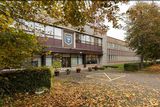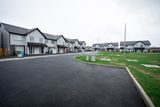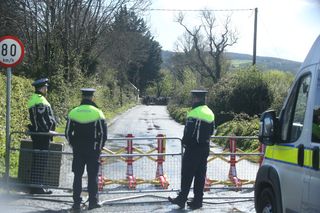BEACONS shining a light on rights and wrongs of education system
A new initiative is going directly into school communities to hear what changes they want, writes Katherine Donnelly
Teacher Thomas Ahern facilitating a BEACONS discussion in Baltinglass with principals, teachers and pupils from Scoil Naomh Iósaf, a primary school, and the post-primary Scoil Chonglais. Photo: Steve Humphreys
When a school in Ennistymon recently installed water fountains, it was not the first to do so, but nonetheless, it may go down in Irish educational history.
It came about thanks to ground-breaking initiative from the Teaching Council, called BEACONS, which is bringing conversations about what's right and wrong with the education system to local communities.
It sees pupils from both primary and post-primary schools, their teachers, parents and principals, as well as other interested parties, sitting down together over about eight hours to share their views.
These groups talk to each other all the time, but the idea behind BEACONS, which stands for Bringing Education Alive for our Communities On a National Scale, is to create a new dynamic.
BEACONS happens in a neutral space and under the direction of a skilled facilitator to ensure everyone's voice is heard. And then, in that safe and inclusive space, they see what arises.
According to Teaching Council Director Tomás Ó Ruairc, it is about inviting conversations about issues that "are of the greatest importance to them, to grow relationships and feed into local and national actions".
He has seen the "joy and energy when they begin to talk to each other and realise how much they share in common, and how little they understand each other's world view".
There is no set agenda and discussions revolve around topics brought to the table by individuals. The open approach could see an overloaded principal talking about sleepless nights, a pupil raising concerns about homework or a call for greater recognition of diverse learning styles.
The first three BEACONS events , in Ennistymon, Co Clare, Baltinglass, Co Wicklow, and Dublin's North East Inner City, have caused quite a stir.
They were facilitated by Chris Chapman, a professional conversation leader working with the Burren College of Arts.
At the inaugural BEACONS, in Ennistymon in May, students were quick to spot the danger that it could end up as a talking shop and they called for accountability. They wanted to know would anything change as a result and would their views be reflected in real action within their schools and the wider education system.
They were not alone in their concern. Ó Ruairc (right) says a student in Dublin's North East Inner City "asked me five times would this make a difference at national level".
While each gathering had a distinctive local character, there was also a commonality in themes, such as demand for the educational response to climate change to escalate beyond programmes such as Green Schools.
Stress about the State exams was also a universal concern, including how the thought of them even preys on the minds of pupils in primary schools.
Other common themes included homework, bullying, resilience, mental health, social media and use of technology in education.
It was the discussion in Ennistymon about climate change that led directly to the installation of water fountains at a local school to obviate the need for plastic water bottles.
In its evaluation of BEACONS, the fountains have been described by the Centre for Effective Services (CES) as the sort of "easy wins" that can come about as a result of such conversations. The CES is a non-profit organisation that works with Government departments and others to bring new ways of thinking to advance social change.
In Ennistymon, along with principals, teachers, parents and students, the North West Clare Family Resource Centre also participated.
Other "easy wins" included change in the dynamic of teacher/student relationships with the introduction of a dialogue cafe in at least one school to facilitate freer communication, while in a national school, homework had decreased.
Another positive was student realisation about how much teachers really cared, with one student changing his mind on moving school as a result of his perception of his teachers.
However, six months on, a bullying issue raised in May was still not sorted, but at a follow-up event last month, "honest conversations seemed destined to facilitate resolution", according to a review.
Baltinglass, Co Wicklow, hosted the second BEACONS where, along with parents, pupils, teachers and principals from local schools, The Lalor Centre for people with intellectual disabilities, the Adult Basic Education Service, West Wicklow, and Baltinglass Outdoor Education Centre also joined in the event.
It started with an ice-breaker session in a local restaurant one evening, followed by a full day's discussion the next on themes that included transitions, whether from pre-school to primary, primary to post primary or post primary to third level.
One idea for enhancing connections was using wellbeing hours in second level to assist with buddy reading in pre-school.
There was also a strong focus on the need for alternative forms of learning, such as conversation based and activity-based, as a means of engaging students and allowing modes of expression other than writing.
For those with a mental disability, there were calls for recognition that they wanted to learn like everyone else and that learning needed to be measured, repetitive, adapted to needs, engaged with outdoors and lifelong.
In Baltinglass, they coined a new word - gaducation - to mean the positive use of technological devices in education. That reflected their discussions about the importance of educating parents, teachers and students on how to exploit the huge potential of technology, while avoiding being exploited by it.
The third BEACONS was located in the heart of one of the most disadvantaged communities in inner city Dublin, but also home to fee-paying Belvedere College.
As well as representatives of students, teachers and parents, other participants/observers included local youth projects and Catherine Anne Cullen, Poetry Ireland's inaugural Poet in Residence, who was recently appointed to work with communities in the area for a two-year period.
Here, stress was a pervading theme, not just for students, but many teachers felt overwhelmed by "conflicting demands, tick-the-box exercises and the pace of change".
Principals reported sleepless nights and the huge pressure of high expectations to solve all problems. Drugs and social media/cyber bullying were also big topics of conversation.
Ó Ruairc sees BEACONS as a process rather than a one-off project, something he wants embedded nationwide.
The next step is a Teaching Council symposium on Friday with a range of education stakeholders to share the learning, with plans to bring BEACONS to other communities in the new year.
Its potential to bring necessary disruption to conventional ways of doing things earned it funding under the Department for Public Expenditure and Reform's inaugural Public Service Innovation Fund.
Join the Irish Independent WhatsApp channel
Stay up to date with all the latest news














